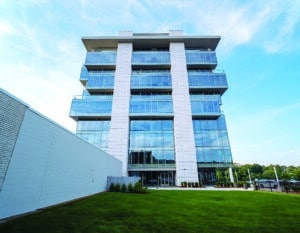
Developer Sal Lupoli’s the Heights at Haverhill opened in 2020. The 42-unit, market rate apartment building is unlike most other residential development in the city so far.
A parade of officials and advocates from across Massachusetts lauded the outgoing Baker administration’s record on housing at a forum in Haverhill Thursday.
“Today’s a chance to celebrate, and it’s really a chance to celebrate. It’s really the culmination of 20 years of progress in this city that’s accelerated over the last 8 years of the Baker administration,” Haverhill Mayor James Fiorentini told the crowd. “When I started, on this site there was a Woolworth’s building that had been abandoned for 50 years. The [Lupoli Cos.’] Haverhill Heights building down the street, that magnificent 10-story building, was an unused parking lot.”
Fiorentini ticked off numerous steps he and other local officials took to pave the way for redevelopment, from slashing parking requirements to establishing a 40R “smart growth” zoning district in the city’s downtown and several rounds of rezoning to bring in housing projects that created an “incredible revitalization.” But he credited Baker and his team with “keeping the good things going” created under the Romney and Patrick administrations, with helping link projects in the city with financing from MassDevelopment and other state agencies and with aiding the sale of a city-owned downtown parking garage for a five-building Lupoli Cos. development that will be the largest in the city’s history.
The end result of the housing-focused growth, Fiorentini said, was the addition of over $115 million to the assessed values of a range of downtown properties, a $5.5 million increase in downtown property tax revenues, 1,000 new downtown residents – only 42 of them children, he pointedly noted – and a doubling of the city’s meals tax revenue to $1 million.
“its our moral responsibility for us as elected officials to solve problems in our state and I can’t think of a more important problem than people who might go homeless because there isn’t enough housing. The answer is simple supply and demand,” Fiorentini said. “There have been no better champions of housing, particularly in Gateway Cities, than Gov. Charlie Baker and Lt. Gov. Karyn Polito.”
In response, Baker singled out MassDevelopment CEO Dan Rivera for praise over his role in spurring housing developments in Gateway Cities like Haverhill and Lynn, saying “not many other people would have understood what [these cities] were trying to do.”
The event was billed as a discussion of the Baker administration’s work on housing over the last eight years, but also functioned as part of a larger farewell tour for Baker and Polito, who touted their record on housing.
“We’ve said for a long time that we think one of the biggest problems we have in the commonwealth is the amount of housing we have,” Baker said. “We’ve treated this as the existential problem that it is.”
Under Baker’s and Polito’s watch, the state has invested $1.5 billion in state resources directly subsidizing housing spurring the production of 22,000 units across Massachusetts, 20,000 of which were affordable, Baker said. The Massworks grant program has also supported infrastructure upgrades that led to the the creation of 26,000 units, he added, and called the One Stop for Growth effort led by Polito a powerful tool that he hopes will continue to be used in the future.
Baker also touted his administration’s work to open the door to minority homeownership – “it’s a door that desperately needs to be open and stay open. It’s a door that’s been closed to them for literally decades” – with programs like the CommonWeath Builder subsidy program. He also noted his administration’s COVID-era eviction diversion initiative, that spent around $1 billion in federal pandemic assistance and state money to pay rent for around 127,000 tenants who couldn’t pay it themselves after losing their jobs due to the pandemic.
Most of all, Baker touted the Housing Choice and MBTA Communities zoning reforms, calling them a “powerful runway” that he hoped municipalities would use to accelerate housing production statewide.
“In Massachusetts you [used to be able to] have a housing project get approved by a majority of an elected body and fails. I used to read those stories all the time and I’d just lose my mind. ‘Housing plan gets a 7-4 vote out of the city council in Salem and fails. How the hell can you get a 7-4 vote and fail? Because on an 11-member city council you need two-thirds,” he said, referencing the Housing Choice reform’s reduction in the required threshold to a simple majority vote.
Housing advocates like CHAPA CEO Rachel Heller also spoke, praising the rules the Housing and Economic Development Secretary Mike Kenneally’s office created to implement the MBTA Communities transit-oriented zoning requirement, which she called “not a burden, but an opportunity” for towns and cities.
Baker urged the state’s municipal leaders and elected officials to keep up the pressure on housing production going forward.
“We have an amazing future possible for us in Massachusetts. We have so many of the key ingredients for people to be successful and we have an incredibly talented and ambitious group of communities from one end of the commonwealth to the other, but we have got to build more housing,” he said.




 |
| 

